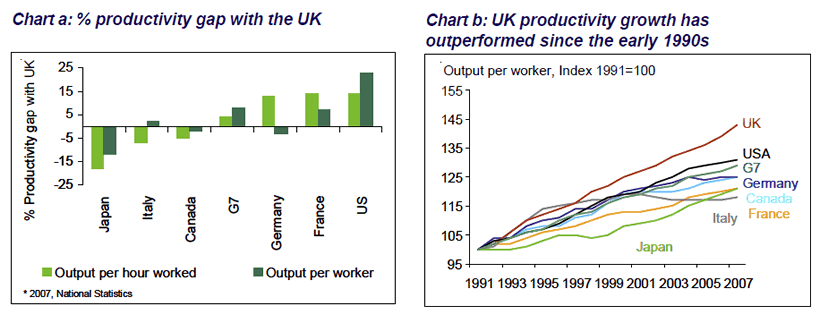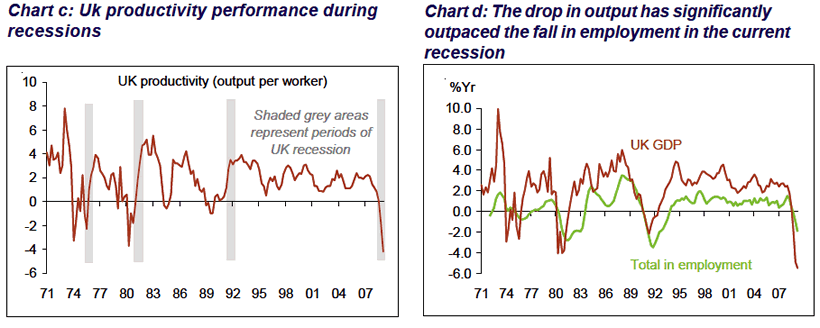UK Economic Productivity, Trends and Prospects
Economics / UK Economy Sep 14, 2009 - 04:05 AM GMTBy: Lloyds_TSB
 One of the key indicators of how well economies perform is productivity. Over the medium to long term, real income growth, and hence living standards, depend on how fast an economy can grow its output based on its labour and capital inputs. Those economies that perform well on this score tend to be those that are the most flexible and dynamic – i.e. those that have a high degree of skilled labour, undertake strong capital investment, employ a high proportion of their available workforce, and combine their labour and capital inputs in the most efficient manner.
One of the key indicators of how well economies perform is productivity. Over the medium to long term, real income growth, and hence living standards, depend on how fast an economy can grow its output based on its labour and capital inputs. Those economies that perform well on this score tend to be those that are the most flexible and dynamic – i.e. those that have a high degree of skilled labour, undertake strong capital investment, employ a high proportion of their available workforce, and combine their labour and capital inputs in the most efficient manner.
Given this, it is unsurprising that the US tops the G7 league table of productivity levels (based on output per hour), while Japan has dropped to the bottom. What is more surprising, perhaps, is the historically weak performance of the UK compared with some of our European neighbours, notably Germany and France. Although these continental European economies are constrained by structural rigidities, the amount of output they produce per hour worked is materially higher than in the UK – see chart a.
UK productivity has been held back by under investment and a relative lack of skilled labour
Admittedly, part of the explanation for the UK’s underperformance on this measure reflects differences in working hours. Given the law of diminishing returns, those economies that have shorter working weeks, such as Germany and France, tend to have higher rates of output per hour than those that work longer, such as the UK. If productivity is instead measured on the basis of output per worker, the UK is around 3% more productive than Germany. Still, the fact that UK workers have to work comparatively longer to generate broadly the same level of output as German workers is hardly indicative of productivity strength. Moreover, even on this measure, UK productivity still falls short of France (by around 7%), and is no better than Italy (although Italy’s output per worker is likely to be flattered due to the size of its informal labour market).
A myriad of factors has been cited for the UK’s historically poor productivity performance. Chief among these has been the limited availability of skilled labour; relatively low levels of capital spending on R&D and infrastructure investment; the slow pace of innovation; and the decline in relatively higher-value add manufacturing. A lack of competition, over-regulation, financial market volatility, and poor labour relations have also been put forward as explanations. In France and Germany, capital spending per worker has traditionally been far higher than it has in the UK, while research suggests that the structure of the firm in these continental European countries has been more conducive to efficiency gains. In other words, they have been good at combining labour and capital.
Global structural change has helped to foster a marked improvement since the early 1990s
Since the early 1990s, however, the UK’s productivity performance – in both absolute and relative terms – has improved noticeably. Although the overall level of productivity remains below those of some of our major trading partners, the gap has closed substantially. Between 1991 and 2007, output per worker in the UK rose by 43 per cent - see chart b - while output per hour worked increased by 52 per cent. Both rates of increase were the highest in the G. Part of the reason why UK productivity growth has improved is because average hours worked have risen. Economic policies have also helped. For example, the decline in union power over the 1980s, the withdrawal of sterling from the ERM in 1992, the decision to give the Monetary Policy Committee operational independence in 1997, and a host of other initiatives to boost entrepreneurship and skills are likely to have had a beneficial impact on productivity growth. But perhaps most important of all has been the


benign economic backdrop. Over the past twenty years, increased globalisation, heightened competition and technological development have fostered productivity gains by raising returns on capital (and thus spurring investment) and by encouraging firms to become more efficient or risk losing market share. Although all the major economies have benefited from these structural changes, they appear to have had a disproportionate impact on those with relatively low productivity levels, such as the UK.
The recession has caused cyclical productivity to drop back, but it should soon turn higher
The above analysis refers to some of the key drivers that have raised the UK’s trend rate of productivity over the past twenty years. Over a shorter horizon, the productivity performance of the UK is dominated by cyclical factors. Since the onset of recession in early 2008, output per worker has fallen by over 4%. As charts c & d show, sharp falls in productivity are typical during downturns, as falls in employment lag declines in GDP. The one notable exception was the recession of the early 1990s, when the fall in employment was particularly severe, and the decline in GDP was cushioned by the UK government’s decision to exit the ERM in 1992.
The fall in cyclical productivity over the past two years is of a similar magnitude to the declines that occurred in the early 70s and 80s recessions. Although the falls in productivity during these downturns were quite volatile, they were generally short-lived. Productivity growth rates picked up relatively quickly once output started to recover, amid continued job shedding. For similar reasons, we believe that productivity growth is either at, or close to, a low in the current cycle. Recent indicators suggest that the recession is likely to have ended in Q2. Still, given the challenges facing the UK, there appears little prospect of a substantial output-led improvement in UK productivity growth over the coming year. Instead, productivity gains are likely to be driven predominantly by continued cuts in employment. Although GDP may be showing signs of bottoming out, we suspect it will be at least another twelve months before the labour market does likewise.
But boosting trend productivity growth poses a formidable challenge
While cyclical productivity is likely to recover over the coming year, prospects for a sustained improvement in trend productivity growth will depend on how successful the UK is in reinventing itself and embracing structural change. The traditional impediments to an improvement in UK productivity, namely the lack of a highly-skilled workforce, a limited culture of entrepreneurship and a lack of home-grown technological innovation, remain. Add to this list the impediments resulting from the credit crisis, such as the constraints on credit availability, the loss of capital investment (both public and private), the rise in bankruptcies, and the prospect of tighter regulation in certain industries, and it seems clear that boosting the trend rate of productivity will be a formidable challenge.
Still, there are grounds for cautious optimism. The depth of the current recession and the UK’s disproportionate exposure to the credit crisis has highlighted the need for the UK to undertake an internal rebalancing away from consumption towards investment and exports. If what emerges is a stronger, more competitive manufacturing base, reduced private sector debt levels, and greater emphasis on improving vocational skills, there a good chance that, over time, a rise in UK productivity results. Such an outcome is not only desirable, but essential if the UK is to maintain its position in the world economy over the coming decades.
Adam Chester, UK Senior Macroeconomist, Corporate Markets
For more information: Emile Abu-Shakra Manager, Media Relations Lloyds TSB Group Media Relations Tel 020 7356 1878 http://www.lloydstsbcorporatemarkets.com/
Lloyds TSB Archive |
© 2005-2022 http://www.MarketOracle.co.uk - The Market Oracle is a FREE Daily Financial Markets Analysis & Forecasting online publication.



